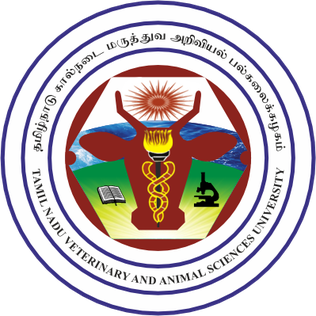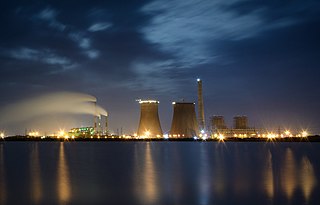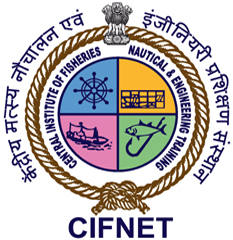
Tamil Nadu University of Veterinary and Animal Sciences (TANUVAS) is a veterinary university founded in 1989 in Madhavaram Milk Colony, Chennai, India. It is composed of the Madras Veterinary College, Vepery, Veterinary College and Research Institute, Namakkal, Veterinary College and Research Institute, Tirunelveli; Veterinary College and Research Institute, Orathanadu, Thanjavur and the Institute of Food and Dairy Technology, Koduvalli, Chennai-52. Research farms are for leprosy bacteria, for prawn and edible fish culture, and for animal feed safety.

Cochin University of Science and Technology (CUSAT) is a state government-owned autonomous university in Kochi, Kerala, India. It was founded in 1971 and has three campuses: two in Kochi and one in Kuttanad, Alappuzha, 66 km (41 mi) inland.

Thoothukudi is a port city, a municipal corporation, and an industrial city in Thoothukudi district in the Indian state of Tamil Nadu. The city lies on the Coromandel Coast of the Bay of Bengal. Thoothukudi is the capital and headquarters of Thoothukudi district. It is located about 590 kilometres southeast of Chennai, 190 kilometres northeast of Thiruvananthapuram, and 580 kilometres southeast of Bengaluru. According to the Confederation of Indian Industry, Thoothukudi has the second highest Human Development Index in Tamil Nadu, next to Chennai. Thoothukudi City serves as the headquarters of Tamilnad Mercantile Bank Limited, one of the leading private sector banks in India. Major educational establishments in the city include the Government Thoothukudi Medical College, Fisheries College and Research Institute, Tamil Nadu Maritime Academy, V.O. Chidambaram College, Kamaraj College, Anna University, and Government Polytechnic College. The V.O. Chidambaranar Port Authority is one of the major ports in India. Thoothukudi is an emerging energy and industrial hub of South India.

Tamil Nadu Agricultural University (TNAU) is the state agricultural university of Tamil Nadu Headquartered in Coimbatore, Tamil Nadu, India.
The Centre for Environment, Fisheries and Aquaculture Science (Cefas) is an executive agency of the United Kingdom government Department for Environment, Food and Rural Affairs (Defra). It carries out a wide range of research, advisory, consultancy, monitoring and training activities for a large number of customers around the world.

The Central Institute of Fisheries Nautical and Engineering Training (or CIFNET) formerly known as the Central Institute of Fisheries Operatives, is a marine studies centre located at Kochi, India. Maintained by the Department of Fisheries and Animal Husbandry and Dairying of the Government of India, the institute was set up to aid research and development in the field.

St. Albert's College is an autonomous liberal arts college located at Kochi, India. It has twenty-three degree courses, twelve postgraduate courses and seven research centres. The National Assessment and Accreditation Council (NAAC) has accredited the college at the "A" level with an aggregate score of 3.24. St. Albert's College (Autonomous) was ranked as one among the best hundred autonomous colleges in India.

The University of the Philippines Visayas is a public research university in Iloilo, Philippines. A constituent university of the University of the Philippines system, it teaches management, accountancy, marketing, economics, chemistry, applied mathematics and physics, marine science education and research, fisheries, and aquaculture. It offers regional studies programs on the preservation and enrichment of the Visayan cultural heritage.

University College of Engineering, Anna University Tiruchirappalli otherwise Anna University Chennai – Regional Office, Tiruchirappalli (AUC-ROT), erstwhile Anna University of Technology, Tiruchirappalli, is a technical university department of Anna University, It is located on Tiruchirappalli–Pudukkottai National Highway 336, Tamil Nadu, India. It was established on 1999 as a part of Bharathidasan University with five departments viz., Bio-Technology, Petrochemical Technology, Information Technology and Pharmaceutical Technology. In 2007, due to management constrains Anna University was split into six universities, namely: Anna University, Chennai; Anna University, Chennai – Taramani Campus; Anna University Chennai - Regional Office, Coimbatore; Anna University Chennai - Regional Office, Madurai; Anna University Chennai – Regional Office, Tiruchirappalli; Anna University Chennai - Regional Office, Tirunelveli. Government acquired this campus from Bharathidasan University and renamed it as Anna University Tiruchirappalli in 2007.The university is an accredited university with powers to grant affiliations to colleges and universities conducting graduate and post graduate studies, as well as diploma courses, and is so recognized by the UGC.
The College of Fisheries, Mangalore, Karnataka is a fisheries education and research institute in India. It was established in 1969 by the University of Agricultural Sciences, Bangalore. The college has become part of the newly established Karnataka Veterinary, Animal and Fisheries Sciences University, Bidar.
Chennai is home to many educational and research institutions. IIT Madras, located in South Chennai is considered as the premier centre of engineering education in India. Anna University and the University of Madras are the oldest state owned universities which are ranked among the best universities in India. The College of Engineering, Guindy and Madras Institute of Technology, which are the constituent college of Anna University along with Alagappa College of Technology are the pioneer institutes of engineering education in India. Some of the oldest medical colleges India, the Madras Medical College (1835) and Stanley Medical College (1938) are located in the city. Notable, liberal arts colleges in the city include Loyola College, Madras Christian College, Presidency College, Stella Maris College, Women's Christian College and Ethiraj College for Women.

The West Bengal University of Animal and Fishery Sciences (WBUAFS) is a public state veterinary university in West Bengal, India. It was established on 2 January 1995 by an Act of the West Bengal legislature. It imparts education and training in veterinary and animal sciences, dairy sciences, and fishery sciences.

Fishing in India is a major sector within the economy of India contributing 1.07% of its total GDP. The fishing sector in India supports the livelihood of over 28 million people in the country, especially within the marginalized and vulnerable communities. India is the third largest fish producing country in the world accounting for 7.96% of the global production and second largest producer of fish through aquaculture, after China. The total fish production during the FY 2020-21 is estimated at 14.73 million metric tonnes. According to the National Fisheries Development Board the Fisheries Industry generates an export earnings of Rs 334.41 billion. Centrally sponsored schemes will increase exports by Rs 1 lakh crore in FY25. 65,000 fishermen have been trained under these schemes from 2017 to 2020. Freshwater fishing consists of 55% of total fish production.

Vels Institute of Science, Technology & Advanced Studies (VISTAS) is an institute of higher education located in Pallavaram, Chennai, Tamil Nadu, India. It was established in 1992 and granted deemed university status in 2008 by University Grants Commission under section 3 of UGC Act 1956.

The Kerala University of Fisheries and Ocean Studies (KUFOS) is a university established by the Government of Kerala devoted to studies in fisheries and ocean sciences. The bill seeking to establish the university was passed by the Kerala Legislative Assembly on 30 December 2010. KUFOS has its headquarters in the premises of the College of Fisheries, Panangad, near Madavana Junction along the Kochi Bypass. The College of Fisheries, established in 1979, was a constituent college of the Kerala Agricultural University. KUFOS is the first university in India exclusively dedicated to studies in fisheries and allied disciplines. The university was inaugurated and dedicated to the nation in a function held at the campus of the College of Fisheries, Panangad, on 20 February 2011.

Tamil Nadu Dr. J. Jayalalithaa Fisheries University (TNJFU), formerly and commonly known as Tamil Nadu Fisheries University (TNFU), is a government fisheries university situated in Vettar River View Campus in the southern part of the city of Nagapattinam, Tamil Nadu, India. It is about 10 km (6.2 mi) from the Nagapattinam Junction Railway Station and about 8 km (5.0 mi) from the Nagapattinam Bus Stand. It is one of the premier fisheries universities named after the former Chief Minister of Tamil Nadu J. Jayalalithaa.

The Department of Animal Husbandry, Dairying and Fisheries is one of the departments of Government of Tamil Nadu. The departments encompasses the departments of animal husbandry, fisheries, milk production and dairying.
The Bachelor of Fisheries Science (B.F.Sc) is a bachelor's degree for studies in fisheries science in India. "Fisheries science" is the academic discipline of managing and understanding fisheries. It is a multidisciplinary science, which draws on the disciplines of aquaculture including breeding, genetics, biotechnology, nutrition, farming, diagnosis of diseases in fishes, other aquatic resources, medical treatment of aquatic animals; fish processing including curing, canning, freezing, value addition, byproducts and waste utilization, quality assurance and certification, fisheries microbiology, fisheries biochemistry; fisheries resource management including biology, anatomy, taxonomy, physiology, population dynamics; fisheries environment including oceanography, limnology, ecology, biodiversity, aquatic pollution; fishing technology including gear and craft engineering, navigation and seamanship, marine engines; fisheries economics and management and fisheries extension. Fisheries science is generally a 4-year course typically taught in a university setting, and can be the focus of an undergraduate, postgraduate or Ph.D. program. Bachelor level fisheries courses (B.F.Sc) were started by the state agricultural universities to make available the much needed technically competent personnel for teaching, research and development and transfer of technology in the field of fisheries science.
Thoothukudi Medical College, also known as TKMC, or Government Medical College Thoothukudi, is a medical institution in South India, located in the city of Thoothukudi, in the state of Tamil Nadu, India. The college is affiliated to The Tamil Nadu Dr. M.G.R. Medical University and is recognised by the National Medical Commission of India and World Health Organization.

Mudnakudu Channabasappa Nandeesha was a development researcher, innovative aquaculture development worker and educator. He is recognized for making critical contributions to the rapid growth of aquaculture by applying research to key bottlenecks to fish production. In India, he conducted successful pioneering field tests of Ovaprim, an ovulating agent, under different agro-climatic conditions to help remove a critical early barrier for freshwater fish breeding. His significant scientific contributions include simplified breeding technology for cyprinids and development of feeds and feeding techniques appropriate to rural aquaculture, and helping improve and spread the practices of small scale fish farming at a time when most attention was on large scale producers. He wrote a regular and widely acclaimed column in Network of Aquaculture Centers in Asia-Pacific (NACA) Aquaculture Asia magazine on farmer innovations in aquaculture. He was described as an "ambassador for aquaculture" and was especially noted for promoting aquaculture for the disadvantaged poor households and women. Along with Michael New, in 2003 he was a founding member of the not-for-profit organisation, Aquaculture without Frontiers. While encouraging poor people to take up aquaculture, he was also a pioneer in promoting equity for women, who had been neglected in the aquaculture boom. Throughout his career, he was in the forefront of initiatives to upgrade the professionalism of fisheries and aquaculture experts, and inspired peers and students in critical new directions.














